Tag: British history
Primary Sources: 19th Century British Pamphlets
Due to budget cuts, the Library ended its previous subscription to this resource. Access has been restored through a purchase of JSTOR content by the California Digital Library.
From the JSTOR site: “Throughout the 19th century, pamphlets were an important means of public debate, covering the key political, social, technological, and environmental issues of their day. 19th Century British Pamphlets, created by Research Libraries UK (RLUK), contains the most significant British pamphlets from the 19th century held in research libraries in the United Kingdom.”
More than 26,000 pamphlets from seven major UK research institutions are searchable and browsable in JSTOR.
Bristol Selected Pamphlets 1800-1899
Cowen Tracts 1603-1898
Earl Grey Pamphlets Collection 1800-1900
Foreign and Commonwealth Office Collection 1545-1900
Hume Tracts 1769-1890
Knowsley Pamphlet Collection 1792-1868
LSE Selected Pamphlets 1800-1899
Manchester Selected Pamphlets 1799-1900
Wilson Anti-Slavery Collection
I recommend reading the guides provided by the project, which describe more fully the content of the collections and how to search them. The guides also point out that the pamphlets don’t only reveal contemporary viewpoints, they contain statistics, illustrations, maps, and other evidence that would inform your research. Because pamphlets were sometimes published in response to another publication putting forward an opposing viewpoint, tracking them can provide insight into public debates.
Trial: Colonial America
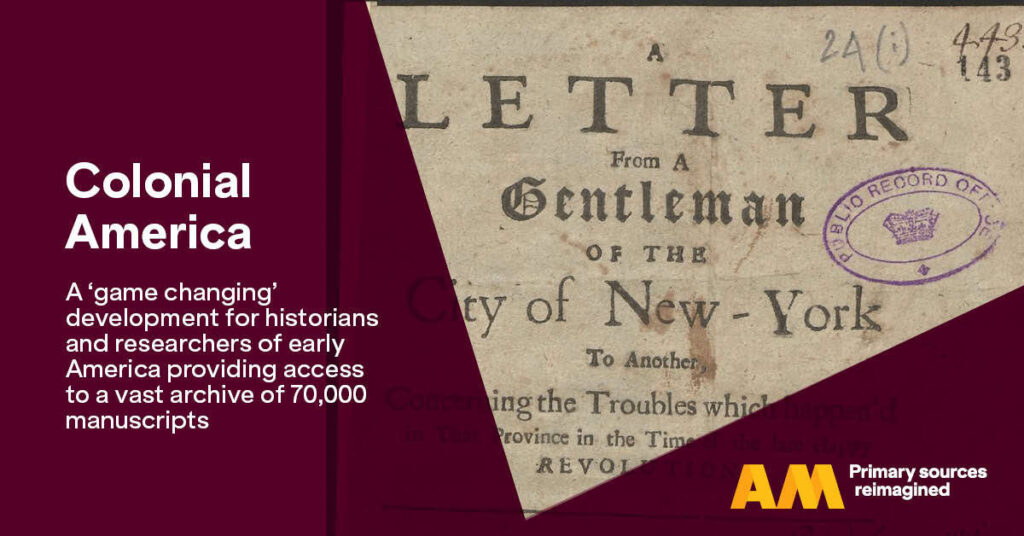
Trial access to the Colonial America digital archive, produced by AM (formerly Adam Matthew Digital), is available until November 29th. This resource provides an extensive collection of primary source documents related to the history of Colonial America, spanning from the 16th to the 18th century. The digital archive offers a comprehensive collection of materials that includes correspondences, diaries, maps, pamphlets, and other types of documents. These sources provide valuable insights into the social, political, and economic aspects of life during the colonial period in North America.
Please note that PDF download options are not available during trials.
Send your feedback to dorner@berkeley.edu.
Primary Sources: Sources of 20th century British public opinion
The Library has recently acquired British Political Opinion Polls and Social Surveys, 1960-1988.
A digitized collection of the complete political and social opinion polls of five major social survey organizations — MORI (Market and Opinion Research International), NOP (National Opinion Polls Market Research); HARRIS (The Harris Research Centre), MARPLAN and GALLUP, covering 1960-1988. Subjects covered include: AIDS, the Channel Tunnel, education, general elections, homosexuality, the miner’s strike, police, poll tax, and many others.
Other resources for British public opinion include:
Mass Observation Online
Digitized archive of the Mass-Observation Project, a “pioneering social research organization,” documenting everyday life and ordinary people in Britain from 1937 to 1972.
BBC Listener Research Department reports, 1937-c.1950
Includes the entire available collection of weekly Audience Summaries, together with the weekly then daily Listening Barometers. Also included are the Audience Reaction Reports on specific programmes and Special Reports on particular themes or issues for the period, as well as some key policy documents produced by the LRD.
Reports (UK Ministry of Information)
These reports were created by the British government’s Ministry of Information during the Second World War for the purpose of monitoring public opinion, and for researching aspects of wartime life of interest to the government. They were a valuable source of information for the ministers and civil servants charged with steering the country through a total war, and give a vivid picture of life on the home front.
Primary Sources: Propaganda collections
The Library recently acquired three collections of propaganda materials: two from World War II a collection of anti-Semitic materials published before the war.
This publication collection consists of over 1,000 air dropped and shelled leaflets and periodicals created and disseminated during the Second World War. The majority of items in this collection were printed by the Allies then air or container dropped, or fired by artillery shell over German occupied territory. Many leaflets and periodicals have original publication codes and were printed in over 10 languages. Only shelled leaflets, Germans to Allies (115 items), are in English.
Allied Propaganda in World War II and the British Political Warfare Executive
This collection presents the complete files of the Political Warfare Executive (PWE) kept at the U.K. National Archives as FO 898 from its instigation to closure in 1946, along with the secret minutes of the special 1944 War Cabinet Committee “Breaking the German Will to Resist.”
German Anti-Semitic Propaganda, 1909-1941
Comprised of 170 German-language books and pamphlets, this collection presents anti-Semitism as an issue in politics, economics, religion, and education. Most of the writings date from the 1920s and 1930s and many are directly connected with Nazi groups. The works are principally anti-Semitic, but include writings on other groups as well, including Jehovah’s Witnesses, the Jesuits, and the Freemasons.
Primary Sources: Leftist Historical Newspapers and Periodicals and Communist Historical Newspapers
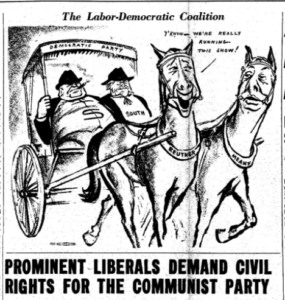 ProQuest’s Leftist Historical Newspapers and Periodicals includes publications supporting the ideology of communism, most published in the United States and United Kingdom. Dates of coverage range from 1848 to 1978, with most coverage in the early 20th century. Complete runs of some publications are not available.
ProQuest’s Leftist Historical Newspapers and Periodicals includes publications supporting the ideology of communism, most published in the United States and United Kingdom. Dates of coverage range from 1848 to 1978, with most coverage in the early 20th century. Complete runs of some publications are not available.
The Communist Historical Newspaper Collection provides full-text access to major American communist newspapers. Includes The Daily Worker (1924-1958); The Ohio Socialist (1917-1919); People’s Daily World (1986-1990); People’s Weekly World (1990-2013); Sunday Worker (1936-1958); The Toiler (1919-1922); The Worker (1922-1924); The Worker (1958-1968).
Trial: Crime, Punishment, and Popular Culture
Until September 20th the Library has access to Gale’s online archive, Crime, Punishment, and Popular Culture, 1790-1920, comprising more than 2 million pages. It contains manuscripts, books, broadsheets, and periodicals sources from institutions in the UK and United States. Some of the printed matter is very scarce, such as Mary Fortune’s 1871 The Detective’s Album, a pioneering police procedural by a woman author, of which only two hard copies survive. Other material has been held in archives, often widely dispersed, and not always readily accessible to the researcher.
Primary Sources: Handwritten Text Recognition functionality added to Mass Observation Online
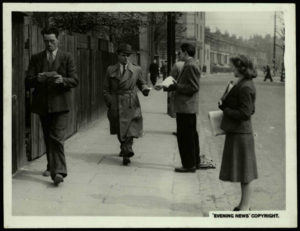 Mass Observation was a social research organization that attempted to record the every day life of British citizens through questionnaires, observation, surveys, and diaries. The digitized content is available in Mass Observation Online, which the Library has owned for many years.
Mass Observation was a social research organization that attempted to record the every day life of British citizens through questionnaires, observation, surveys, and diaries. The digitized content is available in Mass Observation Online, which the Library has owned for many years.
Because much of the content has been handwritten, the search functionality of the resource is limited. Handwritten Text Recognition (HTR) has expanded this functionality to some extent. A basic or advanced search for key term will still only search the metadata that has been assigned to each document. If there is a hit in the document’s metadata for the term, then the HTR software will automatically search for that term in the full text of that document when a user selects the document from the Search Results list.
While this is not as useful as a full-text search would be, it does help users quickly find where a term is located in a document, making it easier to determine the value of that document to their research.
Trial: Secret Files from World Wars to Cold War (British government documents)

Now trialling: Secret Files from World Wars to Cold War
Ends: Wednesday 31st October 2018
Provides 144,000 pages of British government secret intelligence and foreign policy files sourced from The National Archives U.K. Content which is only available elsewhere by visiting the National Archives in London.
Contains nine file series which span four major Twentieth-Century conflicts – the Spanish Civil War, the Second World War, the early years of the Cold War and the Korean War. Includes multiple search and filter options and a series of essays written by the resource Editorial Board of academic experts that contextualize the material and highlights key themes.
Please note: The My Archive and the Document and Citation Download functions are not available on this trial edition of Secret Files from World Wars to Cold War. Documents can be viewed using the image viewer function.
Send your feedback to Jennifer Dorner – dorner@berkeley.edu
Resource: UK Government Web Archive
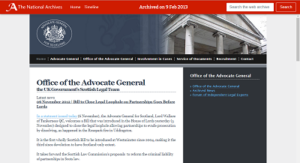 A collaboration between the National Archives and Gov.uk, the UK Government Web Archive gathers every publicly available website hosted by the British government since 1996. The contents are browsable and searchable and include Twitter posts, YouTube videos, and over a billion documents.
A collaboration between the National Archives and Gov.uk, the UK Government Web Archive gathers every publicly available website hosted by the British government since 1996. The contents are browsable and searchable and include Twitter posts, YouTube videos, and over a billion documents.
Primary Sources: British Labour Party papers, 1906-1969
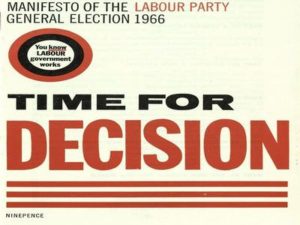 The Library has acquired British Labour Party papers, 1906-1969, a module on the British Online Archives platform.
The Library has acquired British Labour Party papers, 1906-1969, a module on the British Online Archives platform.
These papers cover the foundation of the Parliamentary Labour Party in 1906, then “follow the Party through Ramsay MacDonald’s Governments, two world wars, the first Harold Wilson Government and the early part of his second Government. The events in these records are a reflection of current events as much as of the Party itself. From the suffrage campaign for the electoral enfranchisement of women, to nuclear tests over the Pacific Ocean, through the Beveridge Report, the Trade Union Bill and the development of the United Nations. Early policies like the minimum wage would not pass for decades and Party discipline would be a challenge for every Party Leader. Those challenges existed alongside the removal of the right for employers to sue trade unions and the creation of social services. These papers have been arranged by year and divided into thematic groups for ease of analysis.”